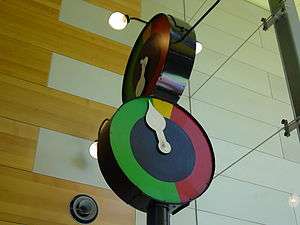Marshalite

The Marshalite is a form of rotary traffic signal that was designed by Charles Marshall in 1936. It consists of two rotors pointing at coloured sections that denoted whether traffic in either direction should proceed, prepare, or stop. Variations exist for pedestrian crossings with additional text instructing crossers to "Walk" or "Don't Walk". The last Marshalite to exist before they were removed in the 1970s was along the Nepean Highway, in Victoria, Australia.
A similar system was used in Europe, i.e. in the Netherlands, Austria (Vienna) and (West-)Germany. In Germany it was called "Heuerampel" (named after the engineer Josef Heuer) and used in a number of places until 1972, when a change in traffic laws outlawed them. For historic reasons one of them is still in place (though unused) in Bochum.
With the Marshalite, drivers have a clear indication of when the signals will change though the exact point of change is not clear.
At the intersection of Whitehorse Road and Union Road in 1969 the clock was used in conjunction with lights so that the point of change was absolute and unambiguous. However the clock provided advance warning of each impending change.
External links
- Traffic Signals; image of pedestrian crossing Marshalite.
- Caring for the Things We Keep; conservation of the "working" Marshalite pictured above, from the Victoria Museum.